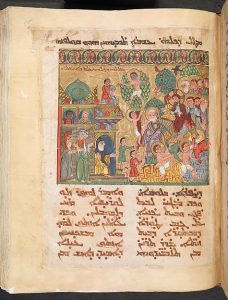예수님의 초막절
유대인의 명절을 지키는 그리스도인들 가파르게 증가하고 있다. 예수님도 신약에 보면 명절을 지키셨던것을 알 수 있다.

예수님은 초막절에 무엇을 하셨나? “이 후에 예수께서 갈릴리에서 다니시고 유대에서 다니려 아니하심은 유대인들이 죽이려 함이러라 유대인의 명절인 초막절이 가까운지라” (요한복음 7:1-2) 요한복음 7장에 예수님이 초막절에 예루살렘으로 올라가시는 이야기가 나온다. 명절 중간에 예수님이 성전에 올라 가르치시는데, 예수님이 진정한 메시아인가 아니면 당장 잡아 처형해야 할 사이비 교주인가에 대한 논란으로 온 예루살렘이 끓어오른다.
그런데 초막절의 제 칠 일에 예수님은 모두를 놀라게 하는 설교를 하셨다. 요한복음 7:37에 명절 끝날을 ‘큰 날’이라고 하였다. 유대인들이 ‘큰 찬양의 날’(호샤나 라바)라고 부르는 이 날은 초막절의 제 칠 일로서 초막절 성전 행사의 절정을 이루는 날이었다. 예수님 당시 첫 6일 동안 제사장은 매일 실로암 못에 가서 금으로 된 물동이로 물을 길어 예루살렘 성문중의 하나인 수문(Water Gate)을 통과하여 성전으로 들어와 제단 앞에 놓인 물두멍에 붓게 된다. 이 때 앞으로 올 한해동안 농사에 필요한 충분한 물과 비를 내려주실 것을 기도하였다. 제 칠 일에도 동일한 방법으로 물을 길어와 이번에는 물두멍 대신에 뜨겁게 달궈진 제단에 붓는다. 그러면 그 물이 순식간에 끓어 증기로 화하면서 마치 기도의 구름처럼 하늘로 올라간다. 그 절정의 순간이 모든 이스라엘 백성들이 성전에 모여 이스라엘의 구원자가 오실 것을 간구하는 순간이다. 바로 그 때 예수님께서 마치 그 기도에 대답하시기라도 하는 듯이 일어서서 외치셨다. [pullquote]“명절 끝날 곧 큰 날에 예수께서 서서 외쳐 가라사대 누구든지 목마르거든 내게로 와서 마시라 나를 믿는 자는 성경에 이름과 같이 그 배에서 생수의 강이 흘러나리라” (요한복음 7:37-38) [/pullquote]
그 자리에 있던 이스라엘의 백성들은 초막절에 간절히 기원하던 물의 영적인 의미와 예수님이 오신 목적을 분명히 깨닫게 되는 순간이었다. 초막절의 진정한 주인공이 바로 예수님이신 것을 말한 것이었다. 한편 초막절 첫 날에 예루살렘 성전 뜰에 높이 25미터에 달하는 네 개의 대형 메노라(램프)를 세우고 40리터에 달하는 항아리로 기름을 부어 불을 밝혔다. 그 불빛이 너무 강렬해서 예루살렘의 모든 정원들이 환하게 밝았다고 한다. 예수님은 곧 이어서 초막절의 또 하나의 상징인 빛을 들어 자신과 초막절을 직접 연결시키셨다. “예수께서 또 일러 가라사대 나는 세상의 빛이니 나를 따르는 자는 어두움에 다니지 아니하고 생명의 빛을 얻으리라” (요한복음 8:12) 이렇게 보면 초막절이야말로 예수님을 상징하고, 예수님이 그 주인공이시며, 또한 우리가 예수님의 재림을 기억하고 기원하기 위해서 지켜야 할 진정한 절기가 아니겠는가? 단순한 명절을 지키는 것을 넘어서 동시에 예수님은 장막절을 메세지로 자신이 빛이라고 하셨다.
[pullquote]요 8:12 예수께서 또 일러 가라사대 나는 세상의 빛이니 나를 따르는 자는 어두움에 다니지 아니하고 생명의 빛을 얻으리라 13 바리새인들이 가로되 네가 너를 위하여 증거하니 네 증거는 참되지 아니하도다 14 예수께서 대답하여 가라사대 내가 나를 위하여 증거하여도 내 증거가 참되니 나는 내가 어디서 오며 어디로 가는 것을 앎이어니와 너희는 내가 어디서 오며 어디로 가는 것을 알지 못하느니라 15 너희는 육체를 따라 판단하나 나는 아무도 판단치 아니하노라 16 만일 내가 판단하여도 내 판단이 참되니 이는 내가 혼자 있는 것이 아니요 나를 보내신 이가 나와 함께 계심이라[/pullquote]
(1) The biblical holy days are infused with spiritual and prophetic significance. Passover corresponds to Yeshua’s death (1 Corinthians 5:7-8), Firstfruits to His resurrection (1 Corinthians 15:20), and the Festival of Weeks (Shavu’ot, or Pentecost) corresponds to the giving of the Spirit (Acts 2:1-4). Trumpets points to the Lord’s return with the sound of the trumpet (see Matthew 24:31; 1 Corinthians 15:52; 1 Thessalonians 4:16; Revelation 11:15), the Day of Atonement (Yom Kippur) points to Israel’s final cleansing (Zechariah 13:1, which follows from Zechariah 12:10 ff.), and Tabernacles (Sukkot) points to the final ingathering of the nations (see Zechariah 14:16-19; see also Revelation 7:9 and Leviticus 23:40, for palm branches and Tabernacles).
(2) The biblical holy days have great historic significance. Although the Messianic significance of the biblical holy days is certainly of greater significance to Christians than is the historical significance, the origin and meaning of these holy days in Israel’s history is also important. So, if it is okay to celebrate Thanksgiving and July 4th in America and to remember the events connected with those days, how can it be wrong to remember Israel’s deliverance from Egypt in the Passover? When connecting this season to the death and resurrection of Jesus Christ, it can be very powerful.
(3) Celebrating the biblical holy days is a good way to teach about God’s acts of redemption. Paul freely made reference to the holy days when writing to the Corinthians, making a spiritual application of Passover in 1 Corinthians 5:7-8 and possibly referencing Firstfruits directly in 1 Corinthians 15:20; notice also how Luke casually made reference to Yom Kippur (the Fast) in Acts 27:9, assuming his readers would understand.
(4) Celebrating the biblical holy days is a good way to recover the Jewish roots of the Christian faith. It is absolutely clear that everything that God does is summed up in His Son Jesus, that our Messiah and King is to have centrality in every way, and that our fullness is found in Him rather than in celebrating holy days or observing special seasons. That being said, the Church has become so Gentilized, so detached from its biblical, Jewish origins, that an appreciation for the biblical, Jewish calendar-the calendar of Jesus Christ and the apostles-is certainly helpful.
